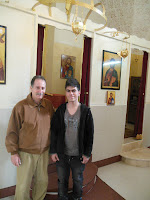 |
| Lili can safely play with stones |
My two “little” granddaughters (ages 5 and 3) were
visiting last week. At one point, Lili,
the three-year-old, picked up some rocks from the parking strip in front of my
building and started throwing them. My
reaction was visceral – I grabbed her arm and started to shout at her, fearful
for her life!
Almost immediately, I realized what I was doing and I
calmed down. We were in Portland,
Oregon, not in Palestine, and the IDF was not about to detain this child for
rock-throwing!
Later, while on the Oregon coast with the girls, I
noticed several children picking up rocks and aimlessly throwing them. “It’s what kids do,” I remember an EA friend
saying last year after her return from Bethlehem, and before my departure for
Tulkarm.
While other grandparents watched their grandchildren idly
tossing rocks as part of their beach play, I remained uneasy. “They’re just being kids,” said a grandmother
sitting beside me.
“It’s fine - here,” I said – “I just think about what would
happen if we were in Palestine,” I added, at which point I launched into
stories of children detained for rock-throwing across the West Bank (see blog
post “Please Pray for the Children" – July 14, 2013).
I was, of course, grateful that my grandchildren would never
have to live in fear of being detained by soldiers for an innocent game, but my
heart remained heavy as I thought of the children who would never enjoy the
childhood pleasures that these youngsters took for granted.
 |
| Elias Chacour speaks at Mar Elias |
And then I started thinking
about another kind of “stones” – the living kind, as the Palestinian Christians
frequently call themselves. I remember
my first visit to Palestine in 2008 – the first time I understood it as an
actual place – and hearing Elias Chacour speak at Mar Elias.
“We are the living stones,” he
told us. “We are the descendants of the
first Christians, the ones who were here at the time of Christ. People come here to see the stones, the
ancient land, but they don’t see us.”
During my stay in Palestine, I
met other living stones. Not a lot –
remember, I was living in a Muslim city in which remained only one church,
which had been burned during the violence of the second Intifada and later
restored.
 |
| Daoud and his son |
But, while in Tulkarm, I met
Daoud, one of three remaining Christians in what had once been a vibrant
Christian community. He was the
self-appointed caretaker of Mar Gerias, the once-vibrant Greek Orthodox church
that Daoud and a cadre of Muslim friends had lovingly re-built after the
fire. And at the time of our meeting, he
was building toilet facilities for the rare visitors who came long distances for
occasional services at the church.
We also met Moana, an Anglican
who could only rarely attend worship because she worked on Sundays (the
Middle-Eastern weekend is Friday and Saturday), and her mother, who was
housebound and depended upon visitors for her fellowship.
Unlike the stones thrown by the children, which appear to be
limitless, the “living stones” are in danger of extinction. The Israeli government blames Muslim
“persecution” for the departure of the Christians but, based upon my
observations and interviews, it is far more likely that the Israeli government
itself is to blame.
 |
| Greek Orthodox Church Mar Gerias |
While I observed nothing but courteous and friendly
relationships between the Christian and Muslim “Arabs” (the pejorative term by
which the Israelis lump both groups), the actions of Israeli soldiers, settlers
and “government policies” themselves seem to be the real reason that
Palestinian Christians leave to seek more hospitable surroundings.
When one wants peace, it is
difficult to live in a situation that breeds war. And when one’s children are being threatened,
a move to safety is the natural reaction.
So I pray for the stones – that the living ones will have the strength
to stay in the face of adversity and that the children can play without fear.


